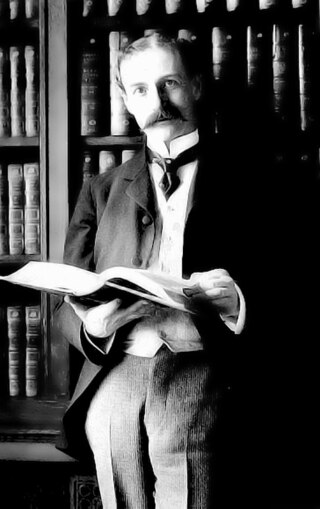
George Herbert Putnam was an American librarian. He was the eighth Librarian of Congress from 1899 to 1939. He implemented his vision of a universal collection with strengths in many languages, especially from Europe and Latin America.
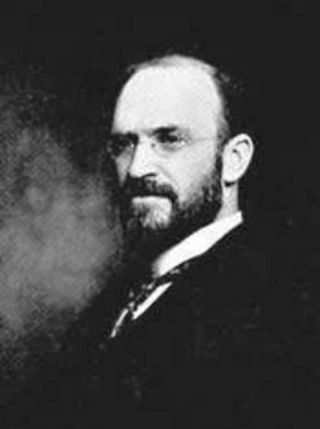
Melville Louis Kossuth "Melvil" Dewey was an American librarian and educator who invented the Dewey Decimal system of library classification. He was a founder of the Lake Placid Club, a chief librarian at Columbia University, and a founding member of the American Library Association. Although Dewey's contributions to the modern library are widely recognized, his legacy is marred by his sexual harassment of female colleagues, as well as his racism and antisemitism.
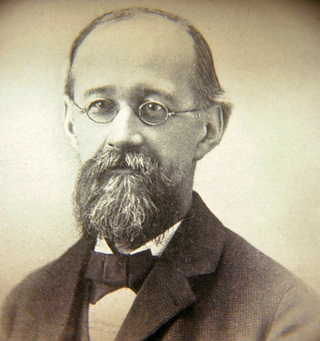
Charles Ammi Cutter was an American librarian. In the 1850s and 1860s he assisted with the re-cataloging of the Harvard College library, producing America's first public card catalog. The card system proved more flexible for librarians and far more useful to patrons than the old method of entering titles in chronological order in large books. In 1868 he joined the Boston Athenaeum, making its card catalog an international model. Cutter promoted centralized cataloging of books, which became the standard practice at the Library of Congress. He was elected to leadership positions in numerous library organizations at the local and national level. Cutter is remembered for the Cutter Expansive Classification, his system of giving standardized classification numbers to each book, and arranging them on shelves by that number so that books on similar topics would be shelved together.

Justin Winsor was an American writer, librarian, and historian. His historical work had strong bibliographical and cartographical elements. He was an authority on the early history of North America and was elected the first president of the American Library Association as well as the third president of the American Historical Association.
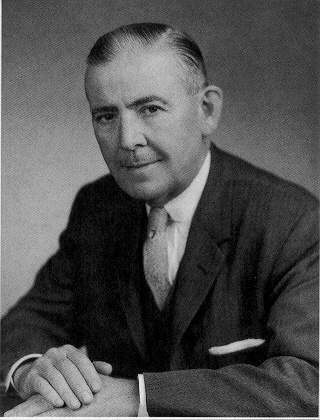
Lawrence Quincy Mumford was an American librarian. He was the eleventh Librarian of the United States Congress from 1954 to 1974.
Walter Muir Whitehill was an American writer, historian, medievalist, preservationist, and the Director and Librarian of the Boston Athenaeum from 1946 to 1973. He was also editor for publications of the Colonial Society of Massachusetts from 1946 to 1978. From 1951 to 1972, Whitehill was a professor at Harvard University.

Hiller Crowell Wellman was an American librarian who served as president of the American Library Association (1914–15). He was librarian for the Springfield (Massachusetts) City Library from 1902 to 1948. Before his tenure in Springfield, Wellman served as librarian at the Brookline Library. In addition, Wellman was special editor for library terms for Webster's New International Dictionary, Second Edition.

Frederic Gershom Melcher was an American publisher, bookseller, editor, and a major contributor to the library science field and book industry. He is particularly known for his contributions to the children's book genre, including the Newbery Medal and Caldecott Medal. Melcher was named as one of the most important 100 leaders in the library science field of the 20th century in an American Libraries article and has been described as "the greatest all-round bookman in the English-speaking world".

George Albert Clough was an architect working in Boston in the late 19th-century. He designed the Suffolk County Courthouse in Pemberton Square, and numerous other buildings in the city and around New England. Clough served as the first City Architect of Boston from 1876 to 1883.
The Massachusetts Board of Library Commissioners (est.1890) is a state agency that supports libraries in Massachusetts. The governor appoints each commissioner. The current board consists of librarians, academics and library trustees: Carol B. Caro, Mary Ann Cluggish, George T. Comeau, Mary Kronholm, Frank Murphy, Roland Ochsenbein, Janine Resnik, Gregory J. Shesko, and Alice M. Welch.

James Kendall Hosmer was an American (Union) soldier during the American Civil War, a pastor, library director, historian, author and a professor of history and literature. Members of the Hosmer family fought in the French and Indian War, American Revolution and the Civil War. As a pastor of the First Church in Deerfield, Massachusetts he left the ministry, feeling duty bound to join the U.S. Army to serve in the Civil War, insisting to serve at the front, where he participated in several major campaigns. As an author and historian he later wrote and published several works about and involving the Civil War and how he viewed the cause of both the North and South. He also authored a number of other works relating to early American history, along with several novels and a fair number of poems. Hosmer also reviewed and published accounts about the Lewis and Clark Expedition at a time when full accounts of the expedition were very few in number and out of print. During his career he corresponded with many prominent writers and historians involving his works. In his latter life he held several prominent positions in various literary associations, including his position as president of the American Library Association.

Klas August Linderfelt was an American librarian. A native of Sweden, he emigrated to Milwaukee, Wisconsin and became a teacher and a librarian. As the first librarian of the Milwaukee Public Library, he became a significant figure in the city and in the library profession, becoming the seventh President of the American Library Association. He left both the city and the profession permanently following his arrest for embezzlement.

Paul North Rice was an American librarian who served as Chief of the Reference Department of the New York Public Library, Executive Secretary of the Association of Research Libraries and President of the American Library Association.

William Rice (1821–1897) was a Methodist Episcopal minister, author, and from 1861 to his death in 1897, the President and Executive Director of the Springfield City Library Association. He was an important public figure in nineteenth-century Springfield, Massachusetts.
The following is a list of works about Boston, Massachusetts.

William Coolidge Lane was an American librarian and historian. He served for over 45 years in the Harvard Library at Harvard University in Cambridge, Massachusetts.
Nina Eliza Browne was an American librarian and archivist. She was employed as a librarian at Harvard University and Boston Athenæum, a registrar at American Library Association, and an archivist at Smith College. She invented a charging system, known as the Browne Issue System, for libraries by 1895. She was a member, secretary, and publishing board member of the American Library Association, and was a member of the Massachusetts Library Association.
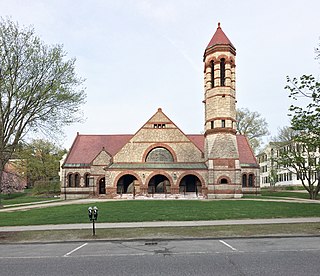
John Lyman Faxon (1851–1918) was an American architect practicing in Boston, Massachusetts, during the late nineteenth and early twentieth centuries. Three of his buildings, the First Baptist Church of Newton (1888), the First Congregational Church of Detroit (1889–91) and the former East Boston High School (1898–1901), have been listed on the United States National Register of Historic Places.
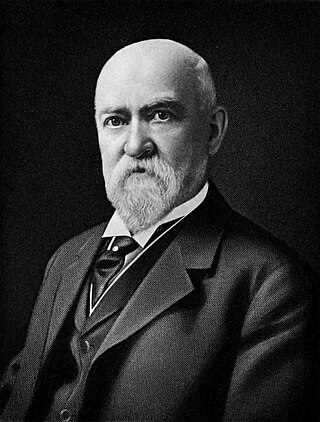
Eugene Clarence Gardner (1836–1915) was an American architect and author of Springfield, Massachusetts. Gardner was noted both for the architectural influence of his extensive practice as well as his writings on the American home. Gardner was the most notable architect of Springfield.















